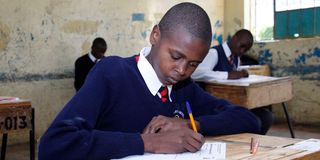Sh22bn budget shortfall puts free education plan in doubt

Form Four candidates at Michinda Boys Boarding and Day Secondary School in Elburgon, Nakuru County, sit their English Paper One test on the first day of the Kenya Certificate of Secondary Education exams on December 2, 2022.
A Sh22.2 billion budget shortfall is threatening the successful implementation of Free Day Secondary Education (FDSE), leaving nearly one million learners without funding in the next financial year.
The shortfall comes despite a Sh964 million increase in the capitation grant for the programme, which funds all learners in public secondary schools.
Appearing before the National Assembly's Education Committee yesterday, Principal Secretary for Basic Education Belio Kipsang said the current enrolment of 3,938,109 learners at a rate of Sh22,244 per learner in secondary schools gives a total requirement of Sh87.6 billion. However, the proposed allocation in the 2023-24 budget for FDSE is Sh65.4 billion.
"This leaves 998,620 learners outside the FDSE programme. We need an additional Sh22.213 billion to fully cover these learners. Even though we say we are funding at Sh22,244 per learner, we're not telling the full story," said Dr Kipsang.
His revelation comes at a time when secondary school principals have been complaining about delayed payment of capitation grants, which, they say, has made running schools difficult.
The State Department of Basic Education has been allocated Sh135.48 billion, comprising Sh15.773 billion for recurrent expenditure and Sh19.707 billion for development. The total allocation represents a net increase of Sh5.018 billion from Sh130.462 billion.
Dr Kipsang told MPs that the budget for Free Primary Education (FPE) has been maintained at Sh12.4 billion even with seven classes in primary school, which will be further reduced to six next year as the introduction of Junior Secondary School (JSS) takes root.
This, he explained, was to increase the per capita allocation for learners in primary schools, which has remained at Sh1,420 since the programme was introduced in 2003.
Dr Kipsang said the allocation for JSS was inadequate as the new segment will have two grades (Seven and Eight). It has a funding gap of Sh17.63 billion. The requirement for JSS is Sh33 billion but only Sh15.5 billion has been allocated.
Grade Eight will accommodate 1,074,709 learners promoted from Grade Seven. At a per pupil rate of Sh15,042, the total requirement is Sh16.166 billion. The Ministry of Education tops up the capitation grant for learners with special needs at the rate of Sh35,730. There are 15,686 learners with special needs in Grade Seven, bringing the requirement to Sh565.9 million.
Over 1.3 million more learners will join JSS in January. They will require a capital of Sh15.776 billion to cater for Grades One and Two. The ministry also intends to spend Sh3.38 billion to improve infrastructure in JSS.
Review allowances
Dr Kipsang revealed that the Kenya National Examinations Council (Knec) will this year review the allowances paid to invigilators and examiners of national examinations. He added that officials contracted by Knec to supervise the 2022 examinations will be paid after discussions with the National Treasury.
The budget estimates also show that Knec has a shortfall of Sh1.8 billion. The council needs Sh1.024 billion to administer the Kenya Certificate of Primary Education but has an allocation of Sh942.1 million. For the Kenya Certificate of Secondary Education, the requirement is Sh4.82 billion while the allocated budget is Sh3.18 billion. Sh1 billion will be used for the national assessment of learners in Grade Six.
"The areas we have identified as key underfunded areas are critical to the achievement of our mandate. We, therefore, require an additional Sh42.043 billion and Sh1 billion in the recurrent and development budgets respectively," said Dr Kipsang.
To improve quality assurance, the PS said the ministry has procured vehicles for education directors, which will be distributed next month. He also assured contractors who built classrooms in secondary schools last year but have not been paid that they will be paid before the end of the current financial year.




